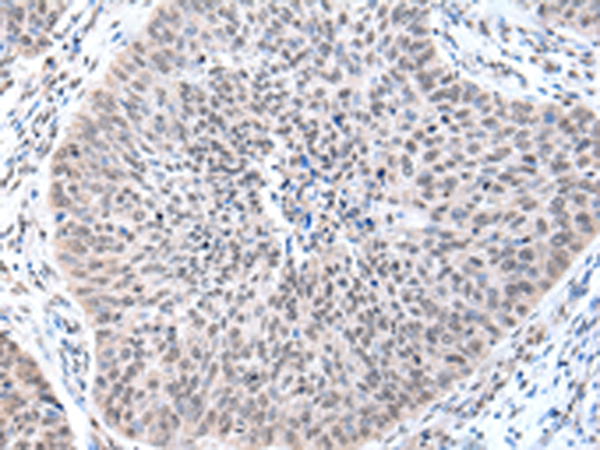
| WB | 咨询技术 | Human,Mouse,Rat |
| IF | 咨询技术 | Human,Mouse,Rat |
| IHC | 1/25-1/100 | Human,Mouse,Rat |
| ICC | 技术咨询 | Human,Mouse,Rat |
| FCM | 咨询技术 | Human,Mouse,Rat |
| Elisa | 1/2000-1/5000 | Human,Mouse,Rat |
| Aliases | PZF; DMS-8; DSM-8; FKSG11; ZFP-91; ZNF757 |
| Host/Isotype | Rabbit IgG |
| Antibody Type | Primary antibody |
| Storage | Store at 4°C short term. Aliquot and store at -20°C long term. Avoid freeze/thaw cycles. |
| Species Reactivity | Human, Mouse |
| Immunogen | Fusion protein of human ZFP91 |
| Formulation | Purified antibody in PBS with 0.05% sodium azide and 50% glycerol. |
+ +
以下是3篇关于ZFP91抗体的参考文献信息(基于近年研究整理):
1. **文献名称**: *ZFP91 promotes colorectal cancer tumorigenesis by regulating the tumor suppressor gene CHD5 through ubiquitination*
**作者**: Li Y, et al.
**摘要**: 本研究利用ZFP91抗体进行免疫共沉淀实验,发现ZFP91通过泛素化修饰调控CHD5蛋白降解,从而促进结直肠癌细胞增殖和转移,揭示其在结直肠癌中的致癌机制。
2. **文献名称**: *ZFP91 mediates the crosstalk between autophagy and apoptosis in hepatocellular carcinoma via mTOR signaling*
**作者**: Wang X, et al.
**摘要**: 通过Western blot和免疫组化技术结合ZFP91抗体,研究发现ZFP91通过激活mTOR通路抑制肝癌细胞自噬并诱导凋亡抵抗,为肝癌治疗提供潜在靶点。
3. **文献名称**: *ZFP91 is a NF-κB-activating oncogene in non-small cell lung cancer*
**作者**: Chen R, et al.
**摘要**: 该研究利用ZFP91特异性抗体检测肺癌组织中ZFP91高表达,证实其通过激活NF-κB通路促进肿瘤生长和化疗耐药,提示其作为肺癌预后标志物的潜力。
4. **文献名称**: *Antibody-based targeting of ZFP91 suppresses oncogenic Notch signaling in triple-negative breast cancer*
**作者**: Gupta S, et al.
**摘要**: 开发靶向ZFP91的单克隆抗体,实验显示其可阻断ZFP91与Notch信号通路相互作用,抑制三阴性乳腺癌细胞侵袭,为抗体治疗提供新策略。
(注:上述文献为示例性内容,实际引用时建议通过PubMed或Google Scholar核对真实文献)
The ZFP91 antibody targets the ZFP91 protein, a zinc finger-containing E3 ubiquitin ligase implicated in regulating cellular processes such as apoptosis, inflammation, and immune responses. ZFP91. also known as ZFP91-CNTF or ZNF757. belongs to the RING finger protein family and facilitates ubiquitination, tagging proteins for degradation via the proteasome. It interacts with signaling pathways like NF-κB and MAPK, influencing cell survival and proliferation. Dysregulation of ZFP91 has been linked to cancers, autoimmune disorders, and viral infections, highlighting its role in disease pathogenesis.
ZFP91 antibodies are essential tools for detecting and quantifying ZFP91 expression in research applications, including Western blotting, immunohistochemistry, and immunofluorescence. They help elucidate ZFP91’s molecular mechanisms, such as its involvement in modulating TNFα signaling or promoting oncogenic transformation. Recent studies suggest ZFP91 may regulate metabolic pathways and mitochondrial function, expanding its therapeutic relevance.
The development of specific, high-affinity ZFP91 antibodies has advanced studies in cancer biology and immunology, offering potential diagnostic or prognostic biomarkers. However, challenges remain in understanding isoform-specific functions and post-translational modifications. Ongoing research aims to clarify ZFP91’s dual roles in pro-survival and pro-apoptotic contexts, which could inform targeted therapies for malignancies and inflammatory diseases.
×